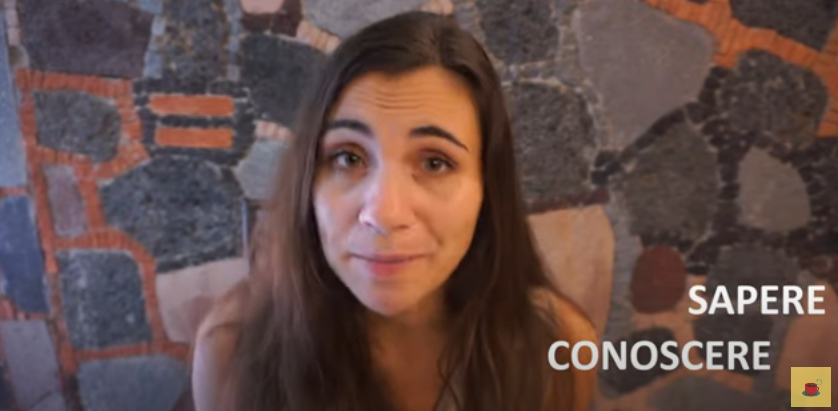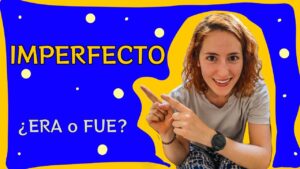Sapere vs Conoscere
Ciao alunni! Bentornati! How are my Italian learners? Are you ready to learn Italian today? Today you're going to learn all about two very important Italian verbs. Sapere e conoscere which both mean "to know" in English!
Since there are two different verbs that mean " to know" in Italy, many native speakers make sure to teach their foreign friends the different contexts for use. Check out this video for an example of an Italian speaker quickly breaking down the difference between sapere and conoscere in one of her many video courses.

Parleremo della differenza tra "conoscere" e "sapere".
To help acquaint you with these two words and commit them to your memoria, we'll once again use the lesson format you might be familiar with if you've seen our Italian Swear Words and How to Say "You're Welcome" articles. So, get ready to revisit our Maestra and her student Riley as they navigate how to know when to use the Italian verb conoscere and when to use the verb sapere.
Siete pronti? E via!
Conoscere & Sapere: If you know, you know!
- Buongiorno, Riley! Come stai oggi?
- Buongiorno, Maestra, that's way too much energy. I'm okay, I s'pose...
- Just okay?? Are you still recovering from our last lesson?
- First, please dial it down a notch; and second, yes! As soon as I got to casa I had to take a nap!
- Well, I hope you were able to rest, because today we're going to talk grammar again! Wanna guess what it is?
- Maestra, I can't read minds yet, so I don't know. Can't you just tell me?
- Molto bene, Riley!
- ...Molto...che?! Maestra, are you having a stroke? I said "I don't know". Do you smell toast?
- Sto benissimo! But you just helped me introduce today's topic! We're going to be covering two verbs today.
- Okay, two sounds manageable... ish. And what did I do to introduce them?
-These two verbs have the same meaning, and you just used the English verb that corresponds to both of them!
- Two verbs... same meanings... and I just used the English version? Hmm... Maestra, I usually get confused after you introduce the topic.
- Riley! You've been learning languages for a while now! You know that being confused is like 73 percent of the process! In order to learn, you have to be okay with being confused... especially when you're learning to speak Italian!
- Maestra, it seems like you're trying to tell me something, maybe to use hand signals?
- Oh, fine, Riley! Today's lesson will cover the verbs conoscere and sapere, which are the infinitive versions of the verb "to know"!
- To know what?
- Riley, stop being silly, and pay attention! Before we start, look at this example of the verb sapere being used in a sentence. It's just one of dozens of authentic videos out there, so maybe it will wake you up!

Noi veramente non sappiamo vivere. 01:45-01:51
- There, awake now? Ready to learn?
- I'm definitely awake, I'm not sure about the rest. And you didn't need to splash a full glass of water on my face.
- Well, by the end of today, you'll at least know how to say "I don't know" in Italian!
- Well, that's my go-to sentence in these lessons already...
FAQ: What's the difference between transitive and intransitive verbs in Italian?
Transitive verbs in Italian are verbs that need an object attached to them. Both conoscere and sapere are transitive verbs because you need an object (which can be a person, place, or thing in common or proper noun form) attached to them You have to know something.
Conoscere: All my friends from Rome to Milano.
- Okay, Riley, sei pronto?
- Does it matter if I am?
- No! It's time to iniziare; we'll even start with the easier one: conoscere.
- Maestra, why do you still bother saying something's easy? It's not. You know it's not, I know it's not, the people reading this know it's not.
- Riley, for the hundredth time... You can look at the fourth wall, you can even lean on it, but please, for the love of Dio, do not break it!
- Ugh, you and your precious fourth wall... Okay, should we just pick it up where we left?
- You bet! Don't worry, Riley, the verb conoscere isn't that hard. I guarantee you won't forget what you learn today! Te lo prometto.
Conoscere is primarily used as a verb:
- To say that you know someone: Conosco Marco e Lucia (I know Marco and Lucia); or that you don't know someone: Non conosco Maria (I don't know Maria).
- To express familiarity with a noun (person, place, thing, or idea): Conosco un buon ristorante (I know a good restaurant).
So far so good, Riley?
- I... uh... guess so?
- Benissimo. Before we move on to some other examples of when you would use the verb conoscere let's look at its conjugation!
FAQ: What does conocer mean in Italian?
Conocer doesn't mean anything in Italian because it's a Spanish word. Spanish and Italian have a lot of similar words, and some even cross over and are the same. Conoscere and conocer is an example of a similar word that means the same in both languages. However, it's important to realize that they are two distinct languages.
Did you know about this irregular verb?
- Alright, Riley, I know I said this was easy, but there's a little, piccolissima thing that's difficult about the verb conoscere.
- Ugh, what is it? It's irregular, isn't it? I just know it. God, I can feel the irregularity crawling through these walls. Especially the fourth one.
- That's right! It's about time you learned another irregular verb! So, let's get started!
To make things easier, we'll just focus on the present tense and the passato prossimo. So, relax, we won't be touching anything like the passato remoto past tense today!
To conjugate "conoscere" in the present tense, just remember the following table:
| Io | conosco |
| Tu | conosci |
| Lui/Lei | conosce |
| Noi | conosciamo |
| Voi | conoscete |
| Loro | conoscono |
Instead, to conjugate "conoscere" in passato prossimo:
| Io | ho conosciuto |
| Tu | hai conosciuto |
| Lui/Lei | ha conosciuto |
| Noi | abbiamo conosciuto |
| Voi | avete conosciuto |
| Loro | hanno conosciuto |
- Okay, so, conoscere uses the verb avere as an auxiliary.
- Esatto, Riley!
- Wow, Maestra, you weren't lying. This really was easy!
- Ma...
- Oh, no, no, no. Don't "ma" me!
- There's a teeny-tiny exception to the rule.
- I hate you.
VIP status
- Riley, what are a few ways you might say someone is famous?
- ...I'd say that someone is famous. Maestra, are you sure you don't smell toast?
- Riley! You'd also say that someone or something is well known, right?
- I mean, I guess! I usually just say someone's famous, that usually gets the point across.
- Okay, true, but that's not the point. You usually use the word "famous" for celebrities, right? If you want to talk about someone who is well known, but not necessarily a star, you'd say they're "known" or "well known".
- I mean, I usually still say "famous" but alright, I'll play along. I'm guessing that you're going to tell me it's the same in Italian, so it'll be "easy" to remember?
- Certo! And like in English, you'd use the verb "essere" and the past participle of the verb "conoscere" to say it. I can see you're looking a little confused, lets's look at a few sentences:
- Filippo è conosciuto da tanti online. (Filippo is known by many [people] online.)
- Teresa è conosciuta da Luca. (Teresa is known by Luca.)
Got it, Riley?
- Now I think I'm the one who can smell toast.
- Don't worry, you'll have plenty of time to practice, now let's move on to what sapere means!
Sapere: Showing what you know
- Alright, Riley, even though in English conoscere and sapere share meanings, you've already guessed you use them to talk about your knowledge of different things!
- Well, Maestra, I didn't really guess, you kind of just told me.
- You're a smart studente, Riley, you would have guessed!
- Aw, shucks, you think I'm smart?
- Shush, you also talk too much! It's time to learn! Sapere is a little more complicated than conoscere-
- *sobs*
- But it all boils down to the same basic rule. You use sapere to say you have knowledge of something.
- Isn't that the same thing as conoscere?
- Not quite, Riely! Before we go into some of our own examples, look at this video to hear the verb sapere used in a sentence. It's a cartoon and it's nice and exciting and it's got colors, so you should like it!
- Hey!

Lo sai perché non puoi uccidermi, amico mio?
- Okay, I did enjoy that, but I'm still offended!
- But I was right, Riley! Conosco i miei polliI!
Anyway, did you notice that the speaker used the phrase "lo sai" and then followed it with a verb phrase?
- No, but I did notice the cute dresses and the badass sword...
- Riley!
- I'm kidding! Yes, I noticed! Gosh!
- Great! Keep that in mind as you look at the following examples.
- Sai che ore sono? (Do you know what time it is?)
- Noi non sappiamo ballare. (We don't know how to dance.)
- Tu sai nuotare. (You know how to swim.)
- Voglio sapere di te. (I want to know about you.)
All of these examples follow the same structure: sapere + a phrase (usually a verb or a verb phrase, not just a noun).
So, you'd use it to say you know/don't know how to do something, or you have/don't have knowledge about something.
Here's an example where someone is saying they know how to read.

Li so leggere i numeri.
- So, conoscere needs a noun, sapere needs a phrase?
- Finalmente! It lives! Now that you've got that down, let's look at how this verb is conjugated in the present and passato prossimo tenses.
- Oh, I wonder if this is yet another irregular verb...
- You bet!
The present tense conjugation for the verb sapere is:
| Io | so |
| Tu | sai |
| Lui/Lei | sa |
| Noi | sappiamo |
| Voi | sapete |
| Loro | sanno |
Instead, the passato prossimo conjugation is:
| Io | ho saputo |
| Tu | hai saputo |
| Lui/Lei | ha saputo |
| Noi | abbiamo saputo |
| Voi | avete saputo |
| Loro | hanno saputo |
- Okay, so we're done here?
- Not quite, there are a few exceptions to the rule of when you use this verb.
- Maestra! I thought we were done!
- Almost, Riley!
While you usually use the structure I mentioned above, there are a few cases that don't follow those guidelines.
FAQ: Is Sapere a modal verb in Italian?
Sapere is a modal verb. That's because this verb is used to express ability, which is one of the characteristics of this type of verb.
Sa di qualcosa?
- Okay, Riley, are you ready to learn this one tiny exception to the general rule for the verb sapere?
- No, I'm getting hungry. And angry at these exceptions. I'm "hangry"!
- I'll do this a little differently though, I'll give you the examples first, then I'll explain the rule. D'accordo?
- Okay, Maestra, whatever you say.
- Okay, try to see if you can figure out what sapere means in these phrases.
- Questa torta non sa di niente. (This cake doesn't taste like anything.)
- Secondo te questo film sa di qualcosa? (In your opinion, does this film mean anything?)
- Il profumo sa di mele. (The perfume smells like apples.)
- Uh, sa... things know other things?
- Sort of! This rule is something you encounter in conversation more than anything else. It's a way of saying that something is or isn't portraying or presenting itself the way you'd expect.
In the first example, the cake doesn't taste like anything, so, it doesn't "know anything".
In the second, you're asking if the film means anything, or "knows" anything.
In the third, since the perfume smells like apples, it "knows" about apples.
- That seems like it's unnecessarily complicated, but what else is new.
- It's hard to learn at first, Riley, but it gets easier with practice!
- Sure, like intermittent fasting...
Ora che sai tutto...
- Okay, Riley, that's all for today's lesson, how are you feeling?
- Hungry.
- That's normal! Like I keep telling you, Italian is a tough language to learn, all of English's Latin counterparts are! But every lesson brings you a little bit closer to mastering the language and being able to speak it like un Italiano vero! And as a reward for being a good boy, I'll take you out for a snack! What do you feel like?
- Weirdly... I feel like toast.
- You and me both, Riley!
FAQ: Is Italian hard to learn?
Italian has a lot more ver conjugations than English. It also has a lot of rules that differ from English, which can make it tricky to get the hang of. However, most of learning Italian is committing things to memory, once you have that down, it's actually pretty easy to learn!





